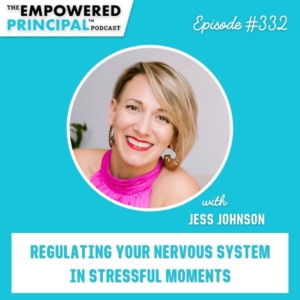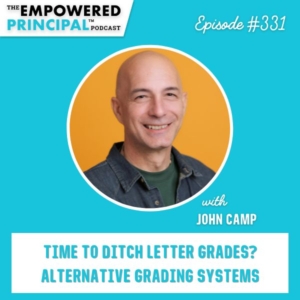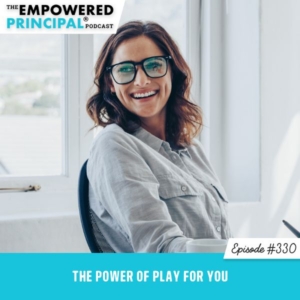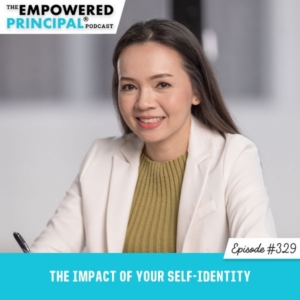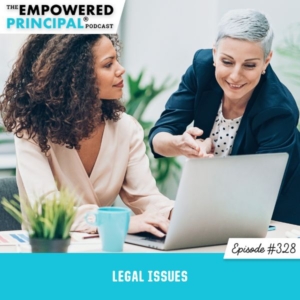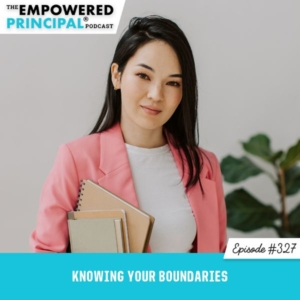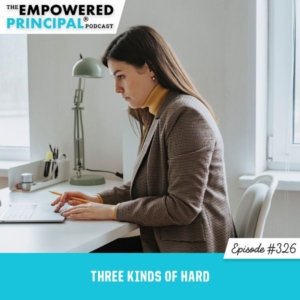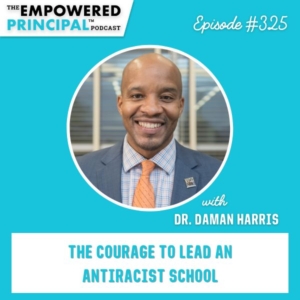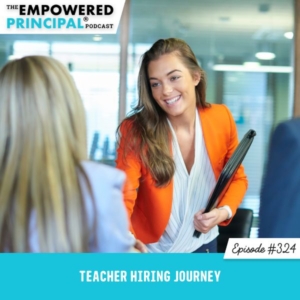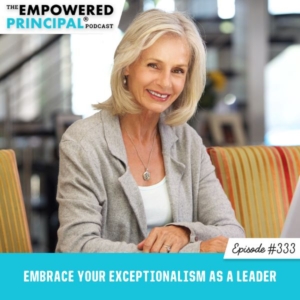
For those of you who see meaning in repeated numbers, this episode is going to speak directly to your heart. The number 333 in angel numbers represents expansion, and as we approach the end of the school year, this is the perfect time to reflect on and celebrate the expansion you’ve experienced this year.
One of the ways you might want to create expansion as a school leader is by embracing exceptionalism. Becoming exceptional is a topic I coach on with all of my clients because it’s what will help you enjoy your life to the fullest and lead your school in the way you truly want, and I’m showing you how to begin identifying yourself as exceptional today.
Join me this week to learn what’s required of you to live an exceptional life, why what you focus on expands, two reasons embracing your exceptionalism might feel challenging, and questions to answer for yourself that will help you see how your life and career are already exceptional right now.
The doors to the next cohort of The Empowered Principal® Collaborative are open! This is the time to decide: do you want to lead your school for the rest of the year as you are right now, or take your leadership skills to the next level? Join us today to become a member of the only certified life and leadership coaching program for school leaders in the country by clicking here.
What You’ll Learn From this Episode:
- Why you don’t have to overwork or hustle to experience an exceptional life.
- How being exceptional isn’t about what you do or say.
- What’s required of you to live an exceptional life.
- Why exceptionalism isn’t a birthright, but rather a choice you have to keep making.
- 2 reasons why focusing on what is exceptional in your life feels challenging.
- How to begin embracing exceptionalism, and what happens when you do.
- Questions to ask yourself about how your life is exceptional right now.
Listen to the Full Episode:
Featured on the Show:
- If you’re ready to start the work of transforming your mindset and start planning your next school year, the Empowered Principal® Coaching Program is opening its doors. Click here to schedule a consult to learn more!
- For a free call to review your year, get in touch with me: Facebook | Instagram | LinkedIn
- Join The Empowered Principal® Facebook Group, Emotional Support for School Leaders, today!
- Sign up for The Empowered Principal® Newsletter
- Podcast Quick-start Guide
- Schedule a 15-minute Q&A Call with me
- Join our Facebook group to be involved in The Summer of Fun, coming in June!

Full Episode Transcript:
Hey empowered principals. Welcome to episode 333.
Welcome to The Empowered Principal® Podcast, a not so typical educational resource that will teach you how to gain control of your career and get emotionally fit to lead your school and your life with joy by refining your most powerful tool, your mind. Here’s your host certified life coach Angela Kelly Robeck.
Well, hello, my empowered principals. Happy Tuesday, and welcome to episode 333. I can’t believe this marks the episode of the 333rd episode of The Empowered Principle podcast. This is amazing. And as you know, I try to seek out meaning in everything. And I create meaning. That means the most to me, I make sense of the world and I make sense of everything around me to the best of my ability. And the meaning that I like to create for myself is meaning that feels good, meaning that feels empowered to me, meaning that uplifts me.
So on this 333 episode, I want to invite you into the meaning that I’ve created for myself, my coaching business, my clients, and really for my entire life. So for those of you who see repeated numbers as meaning like 333, this is going to speak directly to your heart. But even if you don’t think of anything about numeric repetition, this episode is still going to ring true for you.
This is an invitation to living an exceptional life. Right here right now today, not in some future moment in time where you think life will look and feel perfect one day out there in the future. I’m talking about living an exceptional life being an exceptional principal right here, right now, on this Tuesday of your life, where you are today, where you live today, who you’re with today. The school you lead today, the teachers that you currently have, the students who currently have the test scores that they end up scoring for the school year, right here right now.
So the number 333 in Angel numbers for any of those of you who follow that the number 333 represents expansion. And I believe that as we are approaching the end of the school year, it is the perfect time for reflection and expansion to celebrate the expansion of growth that you and your staff and your students have been through this current school year. And the expansion that you look forward to in leading your school in the upcoming year.
A concept that I often teach and one that we talk about in EPC all of the time, and I even do this with my one on one clients, is about becoming exceptional being an exceptional principal or district leader, living as an exceptional person, experiencing an exceptional life. Loving your job, loving your school, loving your family, loving you. Loving what you do, how you spend your time where your energy goes, loving your life being exceptional, celebrating your life, enjoying it. And the best part of experiencing an exceptional life is that it isn’t about always working hard and hustling. Trust me. I’ve tried that theory. I have tested it for decades.
Overworking, over exerting and overscheduling pushing yourself into exhaustion and depletion in the name of servant leadership is not what creates an exceptional result. It’s not an exceptional life. If you’re always tired, or you’re always feeling stressed out or you’re always anxious or you’re always waking up worried or you’re always a little bit nervous or you’re always feeling unsafe. If you’re always in chronic fight or flight your body’s just a little bit on edge. If you’re always feeling that way, that is not an exceptional life.
What I’m talking about is enjoying your life to its fullest, like you lived the life you wanted to live, you led the school you wanted to lead. You enjoy the people you worked with you loved the students that you served. You enjoyed the community that you served, you were able to work with bosses, whether or not you agree with them, are aligned to their values are appreciate their approach. You had the skills to work with them, and you’re proud of yourself, proud of who you are, how you lived, that you lived an exceptional life.
Now look, I know that you can create amazing results with overworking, over exerting overscheduling, that hustle grind. I know you can do that. How do I know? I’ve done it. That’s why it’s so addicting. I lived that way for years. And still, I get tempted to get sucked back in from time to time, because there is a thrill to working and grinding and then earning that and like putting in all those hours and all that effort and energy and being able to hammer out a result. I get it. It feels good. It works. There’s a dopamine hit associated to it. And there’s nothing wrong with living your life. If you love the hustle, and you love the grind, and you love your life and you feel exceptional, because that approach works for you. Then go for it, keep going, keep running my sister, my friend I’m cheering you on.
However, for many of us, at least for me, there were areas of my life that that worked. Like I was a long distance runner for decades. I loved it, it felt great. I pushed myself physically really hard. I loved it. When I was a teacher, I put in lots of hours, I loved it. When I became a school principal, there seemed to be no amount of working or scheduling or being time efficient or effective. There seemed to be nothing. That felt good enough, that felt accomplished enough. That felt fast enough. That felt big enough, that felt in service enough, I just never felt like I was enough.
And I realized there was a moment I’m like, I’m gonna live a very unacceptable life. If I keep hammering with this approach, I have to seek out a new approach. There is a huge rush that comes with that lifestyle. As long as it works for you. That’s amazing. And it does work to an extent. But it also only works if it feels good. That’s how you know it’s working. If it feels good to you the approach you’re taking in leadership and in life, if it’s working for you, that’s amazing.
But if it doesn’t feel exceptional, if you’re not waking up happy to be alive, ready to jump out of bed excited to get up for the day, whether that’s a Monday or a Saturday, there is room for expansion to live a more exceptional life to be a more exceptional leader to live a more exceptional experience. Because being exceptional isn’t as much about what you do or say. It’s more about how you feel, and how those around you feel about themselves while they’re following your lead.
Your feelings are your compass to being exceptional, living exceptional, and feeling exceptional. Being exceptional living an Exceptional Life is all about the emotion driving it, the fuel fueling it, how you feel about yourself. And that’s determined by how you think about yourself, embracing the concept of exceptionalism, you need to embrace that you right here right now have the capacity to identify as exceptional, not by somebody else’s definition or standards by your own standards.
This means allowing yourself to identify as exceptional. Do you even feel qualified to call yourself exceptional? Or do you dismiss yourself? Do you dismiss your efforts, your accomplishments? Or do you say no, I’m pretty exceptional the fact that you’re in school leadership? I think point blank makes you exceptional. Do you know how many millions of people on the planet would never be able to handle the job you’re handling? You already are exceptional. You have to allow it. You have to identify as exceptional before being exceptional, feels good and comes into your life.
Now I’ve heard people say that not everyone is destined for greatness. Some are granted an exceptional life. They’re the lucky ones. They were gifted, they were blessed. And then others just simply aren’t. I challenged that belief. I disagree with it. I don’t believe that it’s true. Because the thought doesn’t feel good to think that some people get it and some people don’t. It pains me to have the thought like some babies are born into the world and they never stand a chance from birth.
I don’t think that’s how the world was designed. I believe I choose to believe because it feels good for me that all lives are exceptional, that we already come with being exceptional, we have the capacity and the potential to expand our ability to feel exceptional and to live exceptional lives, and to take action from the fuel of feeling exceptional in our lives. Because in my definition, in my book, my Webster’s Dictionary, exceptional lives come in limitless forms. Exceptional is not one way of living, just because if you’re here, and you’re a white male, and you live in the United States, and you’re very wealthy, and you have a lot of power, that might be identified as being an exceptional human, that does not make you an exceptional human, FYI.
Now, if you are one of those humans, and you happen to be exceptional, we love you. We love all the humans, but title, status, are not definitions of exceptional, it’s not defined by the awards you are granted, or the length of your resume, or the size of your home, or the number of cars you drive. It’s not the test scores that your district receives or your school receives. It’s not your students, it’s not your staff. It’s not the accolades you get from your boss. It is not your title. It’s not your status. It’s not your location. It’s not a position of authority. It’s none of those things.
We identify people who are exceptional, because they’re wealthy, or because they’re rich and famous, or because they’ve contributed to the world in some massive way. But think about your own family. Think about your great grandparents, who did exceptional things, who went through exceptional times, who created the life that you have now, who laid the foundation that paved the road for you to have this life that you have.
They are exceptional, whether they’re in the history books or not, they were exceptional, your parents who did the best they could. Regardless of the relationship you have with your parents, they did an exceptional job, how do we know you are here on the planet today, serving in the capacity that you want to. Exceptionalism isn’t a birthright that you either are chosen or not chosen. You choose you, you choose to be exceptional. Being exceptional is really about embracing exceptional thoughts about yourself, about the work you do, about your accomplishments. Being proud of them, calling them exceptional, having exceptional thoughts about other people, your teachers, your staff, your students, your own children, your partner, your spouse, your family, the community you live in, the community you serve your school, your campus, the culture, your test scores.
Exceptional thoughts about your life, your body, your friends, everything about you, your home, your being, your existence. It’s about cultivating exceptional thoughts about you, looking for what is already exceptional about you and your life is the key. You’re living in gratitude in the current present moment. You’re grateful for the things that you want, that you already have in your life.
One of the activities I have my clients do is I say, tell me everything that you want, the list I want want, want want want. And I’ll say of the items you listed, how many of them do you already have, and that stops them in their tracks because one of two things happen. The list either is a list of things that they actually already have in their life and they just forgot to acknowledge that and be appreciative and grateful, or they listed everything they don’t have, which means they’re focusing on what they don’t have versus all that they do.
So try that. Notice. You have an exceptional life. You have electricity and running water, you have heated running water that comes right to your faucet into your shower. You have clean drinking water, you have a very comfortable bed to sleep in. You have heat, you have shelter, you have clothing, you have food available, so much food available in the United States. We have so much that we want someone takes your internet away for an hour, someone takes your phone away for five minutes. You’re grateful to have that phone back. You live in exceptional life. See it, acknowledge it, embrace it, live it, be it. You want to notice what is going so well, what makes life so easy right now, internet is one of my favorites.
When I moved very recently, and I’ll share that story at another time, I’ve had a huge chapter shift in my life that I’ll share with you guys at a later time. But when we moved into our new place, we didn’t have internet for almost a week. And I was like, wow, you know, I had my phone 5g on my phone, but I cannot run my business without internet. I need Internet access, it became highly appreciative when they came in installed the internet. I loved it. And I’m so grateful for it. And I don’t want to forget that I have it. And that it’s an exceptional part of my life.
That is the power of being exceptional living an exceptional life. When you live and breathe exceptionalism into your life right now, your brain is going to start to redirect itself to collecting more and more evidence of all the things that feel as though in fact, you are an exceptional human, an exceptional being an exceptional leader.
And here’s why this works. What you focus on expands in both directions. So if you focus on if you wake up, and you’re like, oh, it’s raining. Oh, I’m tired. Oh, I have to deal with this parent today. Oh, I don’t want to have to do testing. You’re focusing on what isn’t working, what you don’t like about the day what you don’t like about yourself, what you don’t like about how your clothing fits what you don’t like about your car, what you don’t like about the commute and you get to work and you’re kind of disgruntled about the day ahead of you.
And then you’re thinking about that parent you got to talk to and that teacher you have to let go and you’re feeling very unaccomplished. It’s the end of the year, what did we even get done? Nothing seems to be working, I’m scared about the test scores. And then my boss gave me some negative feedback. What you focus on expands in your life, both positive and negative. You know how when you wake up, and you’re in a bad mood, like the rest of the day, it’s almost like, your brain just decides, Okay, we decided to have a bad day. Let’s focus on everything that went wrong today. And then we go home, and we tell this horrible day like we had such a terrible, horrible, no good, very bad day. Right?
That’s what also works in the exceptional direction. What is exceptional in my life? How am I exceptional? What is working? What’s going well, what do I love about my life? What do I love about my job? What do I love about today? What am I so grateful for that I have, I don’t even haven’t even taken a moment to realize it. Wow, clean sheets, fresh bed, having, you know, laundry facilities in my home, where I can launder my clothing at any time. Some people have to truck their laundry to a laundromat or to the river. Think about this, we have exceptional lives.
But I know the human brain. I’ve been studying it for decades. And here’s what I have found to be so challenging, about focusing on what’s already exceptional. There’s two things that I’ve noticed, one, the brain is wired to problem solve, it kind of goes to the next problem, it just jumps from one problem, it solves it, then it jumps to another problem. And then it solves it. It loves to solve problems because we get the dopamine hit. It’s such a pleasurable feeling to have solved a problem, right? It’s like a to do list when we get to check the boxes, it feels really good. When we solve a problem, we get to put closure on it that feels really good.
But guess what? Once that feeling dies down of satisfaction, we got to find another problem. So then we live a life stringing problem to problem to problem to try and solve them. If we can’t we feel disappointed and disgruntled and discouraged. And we jump onto the next thing, right? So the brain is wired for that. So we have to be aware of that we have to create awareness around that and be intentional about what we’re focusing on giving at least equal airtime to what is working and being in the gratitude of that along with problem solving. Okay, so that’s problem number one. That’s challenge number one.
Challenge number two is that we have been conditioned that it is not socially acceptable to focus on being exceptional, especially women are told to be humble, to be graceful not to seek the spotlight. We should be a servant leader. We should eat last we should take care of others. We should put ourselves at the very end of the line. Men have less problem shining the spotlight on themselves owning their exceptionalist feeling exceptional. They love it.
Not all of you men I know I’m not. I’m not picking on you. But there is a mindset, particularly with women, that we should not so dare to say how exceptional we are. And actually when we do. You’ve seen it on social media. Women who are confident women who believe that out, they are exceptional women who are successful, living, abundant, successful, innovative, really engaged, rich, delicious, expansive lives when they’re online, people hate on them, they have to tear them down.
And then those women have to go through the process of coaching or therapy or whatever level of support, they need to be reminded of their exceptionalism. The more exceptional you get, the more people that hate on you. And the only people who are hating are people who aren’t focusing on their own exceptional lives, and creating their own exceptional lives. So the fact that you’re a school leader, out there being exceptional, you’re going to have teachers and parents who want to cut you down, not because you’re not exceptional, but because they’re not focused on their own exceptionalism. Do you see the difference?
But I want to say something, when you think about these two obstacles, where the brain likes to solve problems, that’s amazing. I mean, we’re innovative creatures designed to evolve and expand and grow and learn and develop. That’s working on point. So when our brain is focusing on problems, that isn’t a problem. We just also want to be grateful and aware and create this balance as equal airtime of problem solving, with also focusing on the amazingness of what’s already been solved for us.
Electricity has been solved for, amen, we don’t have to solve that problem. Right technology, there’s so much with technology that has been solved by somebody else. Thank you, thank you. There are have been roads, airplanes, cars, trains. Our lives have been made exceptional. They have been so enhanced by other people problem solving our ancestors before us the Industrial Revolution, all of those chapters have been created so that we can live exceptional lives, we want to honor that. Honor, the ingenuity and the innovation that occurred decades and centuries ago, to allow us the privilege of living in this exceptional life, this exceptional time, right here right now.
And equally. So it’s also fun and our choice if we want to, to contribute to the exceptional lives we want our children to lead and their children to lead. So we’re paving the way for the future, as the past paved the way for us. But we don’t want to deny and dismiss and not celebrate the exceptional, that is in you, in the people you lead, in your students in your school, in your bosses in the community in your life. It doesn’t make sense to focus on and to believe that we should not focus on exceptionalism.
So if you’ve been taught, and I’m sure if I were to do a poll, you mostly all raise your hand, who has been told right to be humbled to be grateful to be small, to not over shine to not make someone feel bad, to not brag to not boast to not be your biggest, boldest, brightest self. If you’ve ever been taught to kind of shine, turn down the light, turn down the volume, play small, talk small, think small, be small, don’t be seen. Don’t be heard. If you were ever conditioned around that. I thought to myself, why? Why on earth would we tell the little humans to not be exceptional to not embrace their exceptionalism, their exceptional selves, and the gifts they were given to be exceptional.
And the reason that exceptionalism has no limit is because we need all of the different kinds of talents and skills and exceptional beings on the planet to make the full planet work for the humans. It’s the universal balance that we’re creating. So that is why there are people who were born to teach kindergarten and who love it. That was me. I loved the littles. I loved kindergarten so much, you guys. I literally was born to teach kindergarten.
And there are other people who were born to teach fifth grade, or seventh grade or 12th grade. I have one of my friends who was a fifth grade teacher, she moved down to second grade for one year just to try it out. And she was like, nope, not for me, going back to the big kids, which is funny because now when I think about big kids, I don’t think of fifth graders, the big kids but they are older, a little more mature than definitely K through two. But we’re all born with exceptional talents. And it’s our job to get on the right seat on the bus to feel exceptional. To be exceptional to live that exceptional life.
You know how good it feels when you feel good about your life. You’re like, I was born for this. I was born to be a kindergarten teacher. I am a kindergarten teacher. I’m an exceptional teacher. The parents love me, the kids love me. My classroom is amazing, like that flow, that is exceptionalism. You don’t have to be a bazillionaire to be exceptional. You don’t have to fix planet Earth, you don’t have to have invented the light bulb. You don’t have to have made plastic, invented something crazy or invented flight to be exceptional. You’re exceptional when you’re in your zone, when you’re just doing you, when you’re doing your thing, when you’re in flow.
So when I say that focusing on what’s already exceptional in your life, my clients will say, hey, like, I wonder if I’m even supposed to want more if I’m already exceptional. Now, what’s the point of development, growth? Evolution? Evolvement? Like, why do I continue to desire things? Or want things that I don’t yet have? Is that wrong? And here’s what I love about this question. The answer is, you were born, to create, to grow, to develop, to evolve, you were born to have desires, you will have desires and wants that are unmet all the way up until your last day on earth. Because that’s how we evolve.
That’s how we grow. That’s how we continue to experience an exceptional life. Because once we’ve achieved this, we want something more. And that’s not a problem. That’s the sign that you’re on the path to more exceptionalness. It’s why we were drawn to education, right? Everybody was drawn to create the exceptionalism on this planet that they were born to create. And for us, it’s education. It’s why we were drawn into education. It’s literally one of the initial core founding institutions that humans developed to evolve humankind. That’s why we’re in schools, right?
So I invite you to live an exceptional life, to identify as an exceptional leader, to identify your life as exceptional. And to focus on all that is amazing in your life. You are an exceptional leader, you are leading your school to exceptional results. It’s all about grounding yourself in the belief that you’re already exceptional. And at the same time, you also have the capacity and potential to continue expanding. The experience of being exceptional, becoming exceptional. And living as though you are already exceptional is about your willingness to embrace it as it is to see it for what it is now and also be willing to explore and expand and evolve.
Go beyond your years in school, learn more than just what is right in front of you. Question, challenge thoughts and beliefs that people told you to think way back when you are children or young adults. Are they true? Here’s how you know. If the thought feels good, it’s working for you. It’s true. If a thought doesn’t feel good, if it brings up negative energy, negative emotion, it’s not true for you. You get to learn and explore and innovate and create and have fun and be happy. Be curious, be joyful.
There is no bonus prize for suffering your way through school leadership. You are not going to get a pin for 25 years of suffering in education. You’re not going to win an award for burnout and exhaustion. There’s no payout at the end for overworking, you don’t get a bonus at the end of your career, because you overworked. I really want you to let that sink in. Think about that.
Also think about this. People want to be led by someone who not only sees the amazingness within themselves, but who also sees the amazingness within them. Think about it. Think about how good it feels for you to have a leader who sees your empowerment and your potential, who believes that you’re capable, that you’re smart, that you’re worthy that you’re skilled, somebody who trust in you to do your job, who loves their job, and they’re happy to be around, they’re fun to be around. They are fulfilled. They don’t need you to be some version of you that you’re not for them to feel like they’re a good leader.
They already feel exceptional as a leader, and they see the exceptionalism in you. They see your greatness, they believe in your greatness, they trust it, they let you go be great. That’s the kind of leader who uplifts who inspires people invites them into the best version of them. And if you want to be that leader, all you need to do is simply embrace your exceptionalism, your greatness, your potential. Delight in who you are as a leader, the skills that you have, be joyful, be curious, be lighthearted, be fun, be funny.
Don’t take everything so seriously. Yes, you’re gonna have bad days. That doesn’t have to define or take away your identity as an exceptional leader. Exceptional leaders have exceptionally hard days, but they also have exceptionally good days.
So if your mind tends to focus on the negative, like it wakes up and you’re like, why am I always so negative, like mine, then your brain is totally normal, you are right on track, because everybody out there, all those principals who are happy, they also have negative thoughts. So your brain is right on track, it’s doing its normal thing. That is why I created EPC, the Empowered Principle Collaborative. I created it because our brains default to the negative because our brain offers us grumpy thoughts, because we’re looking at what’s not working, it’s default. And we’ve been conditioned. So we’ve got double layers, working against our exceptionalism.
So EPC is a space that I created, where we can all redirect our brains together, making it easier to refocus on being exceptional. You know, when you’re around people that feel good, you just feel so much better about yourself. That’s what EPC is, we all just feel better. Because we’re together, and we’re talking about this. We’re like, I had a really tough day. But I want to end my day focusing on what’s exceptional about my life, and what I did, right, and what’s going well at my school, it’s so much easier to do that when you’re surrounded by other people who are doing it as well, and who lift you up, to feel good about yourself in the work that you’re doing.
So, as you go off into the week, I invite you to reflect on this past year. How was it exceptional? How were you exceptional, and I’m going to invite you to join EPC this coming school year to plan out and create an even more exceptional year this coming fall. Are you ready? Let’s go. Let’s go be exceptional. Have an amazing week. You guys. I will talk to you all next week. take really good care. Talk to you soon. Bye.
Hey empowered principal. If you enjoyed the content in this podcast, I invite you to join the Empowered Principal® Collaborative. It’s my latest offer for aspiring and current school leaders who want to experience exceptional impact and enjoy the school leadership experience.
Look, you don’t have to overwork and overexert to be a successful school leader. You’ll be mentored weekly and surrounded by supportive likeminded colleagues who truly understand what it means to be a school leader. So join us today and become a member of the only certified life and leadership coaching program for school leaders in the country. Just head on over to angelakellycoaching.com/work-with-me to learn more and join. I’ll see you inside of the Empowered Principal® Collaborative.
Thanks for listening to this episode of The Empowered Principal® Podcast. If you enjoyed this episode and want to learn more, please visit angelakellycoaching.com where you can sign up for weekly updates and learn more about the tools that will help you become an emotionally fit school leader.
Enjoy The Show?
- Don’t miss an episode, follow on Spotify, Apple Podcasts or RSS.
- Leave us a review in Apple Podcasts.
- Join the conversation by leaving a comment below!




